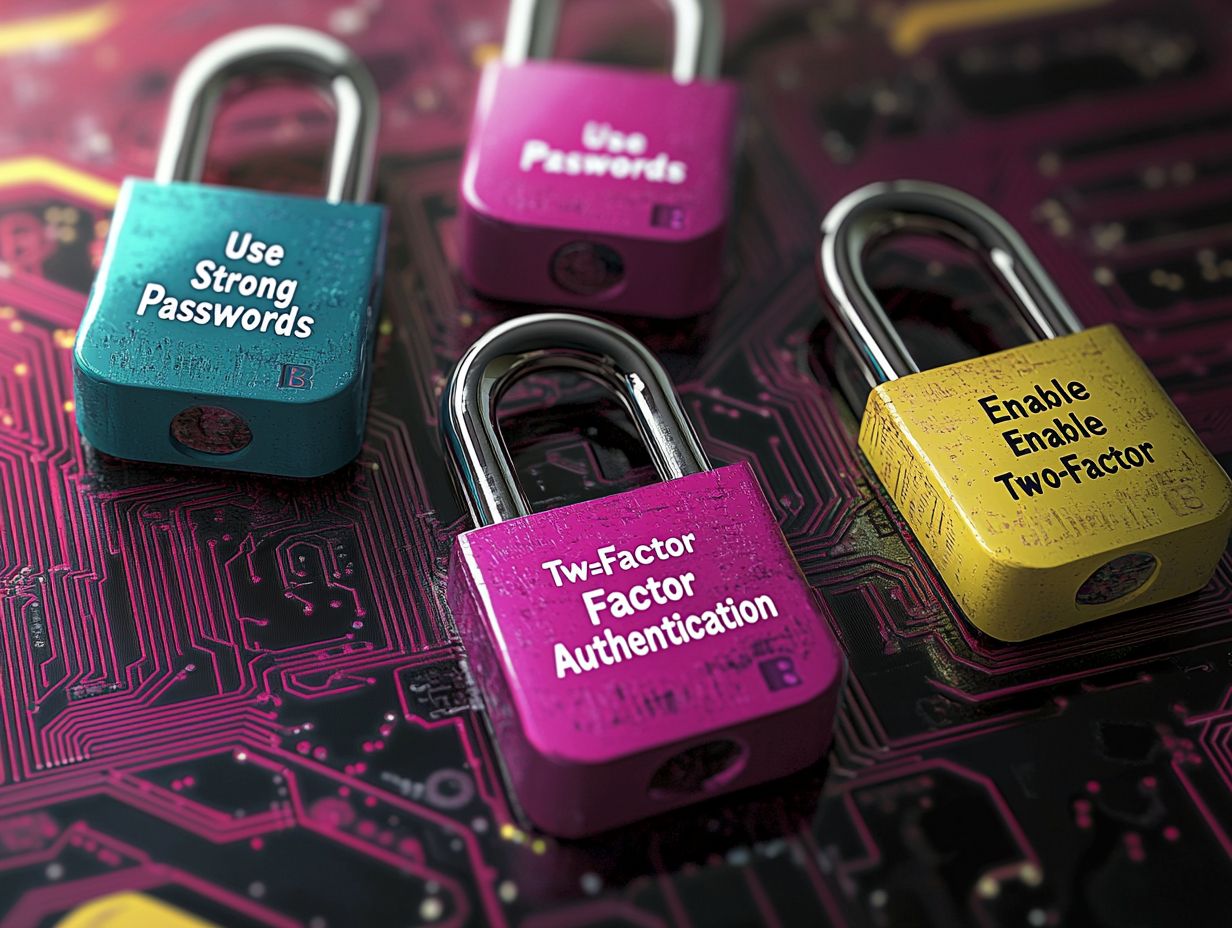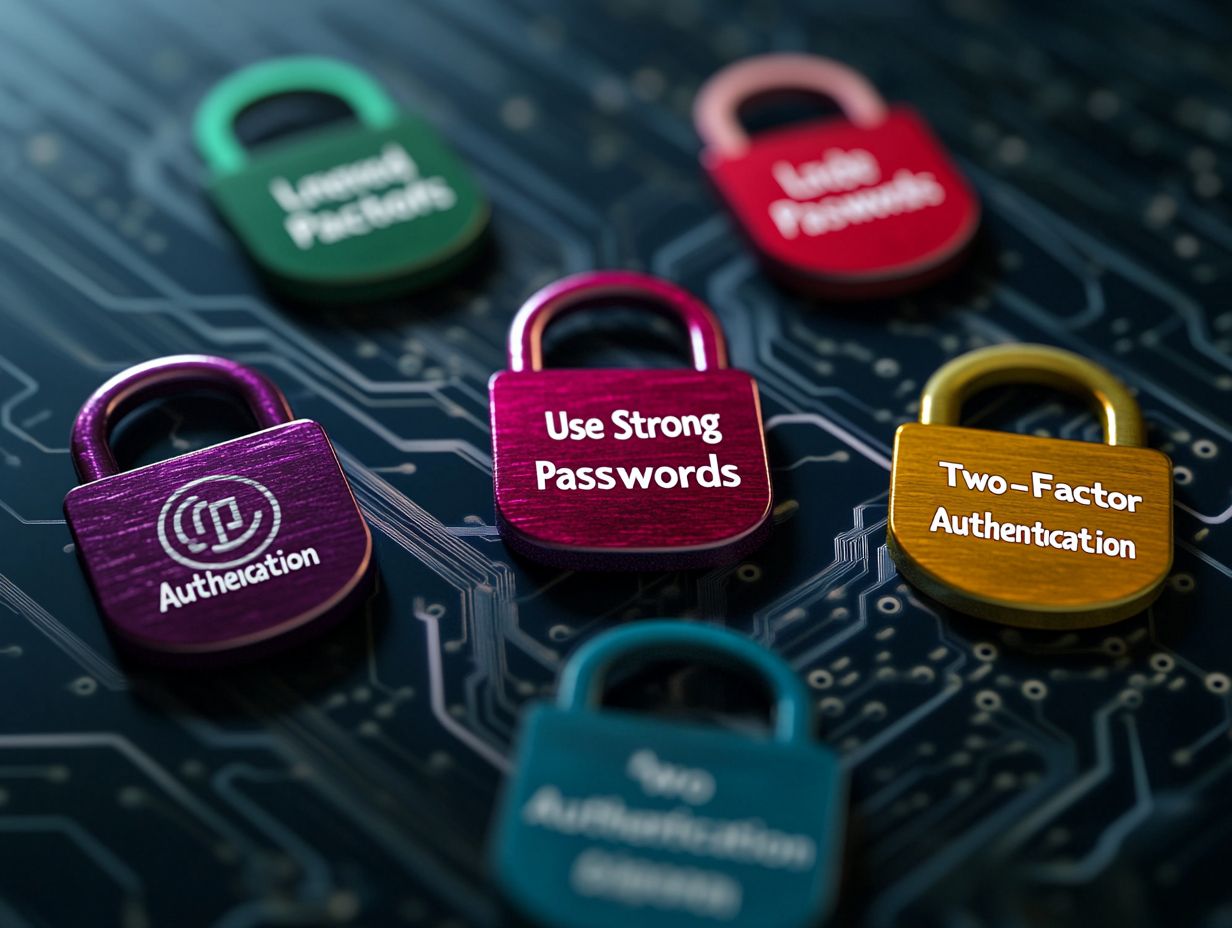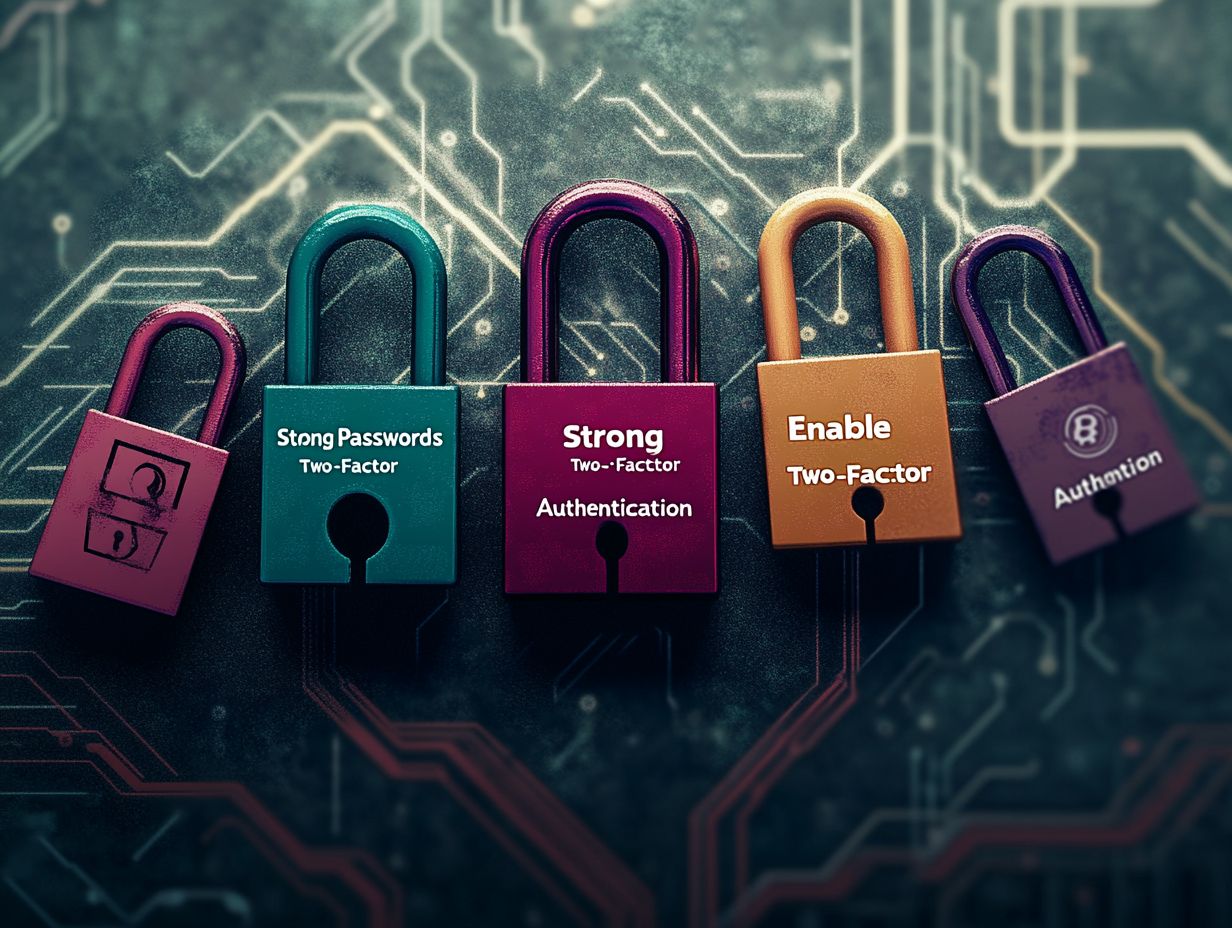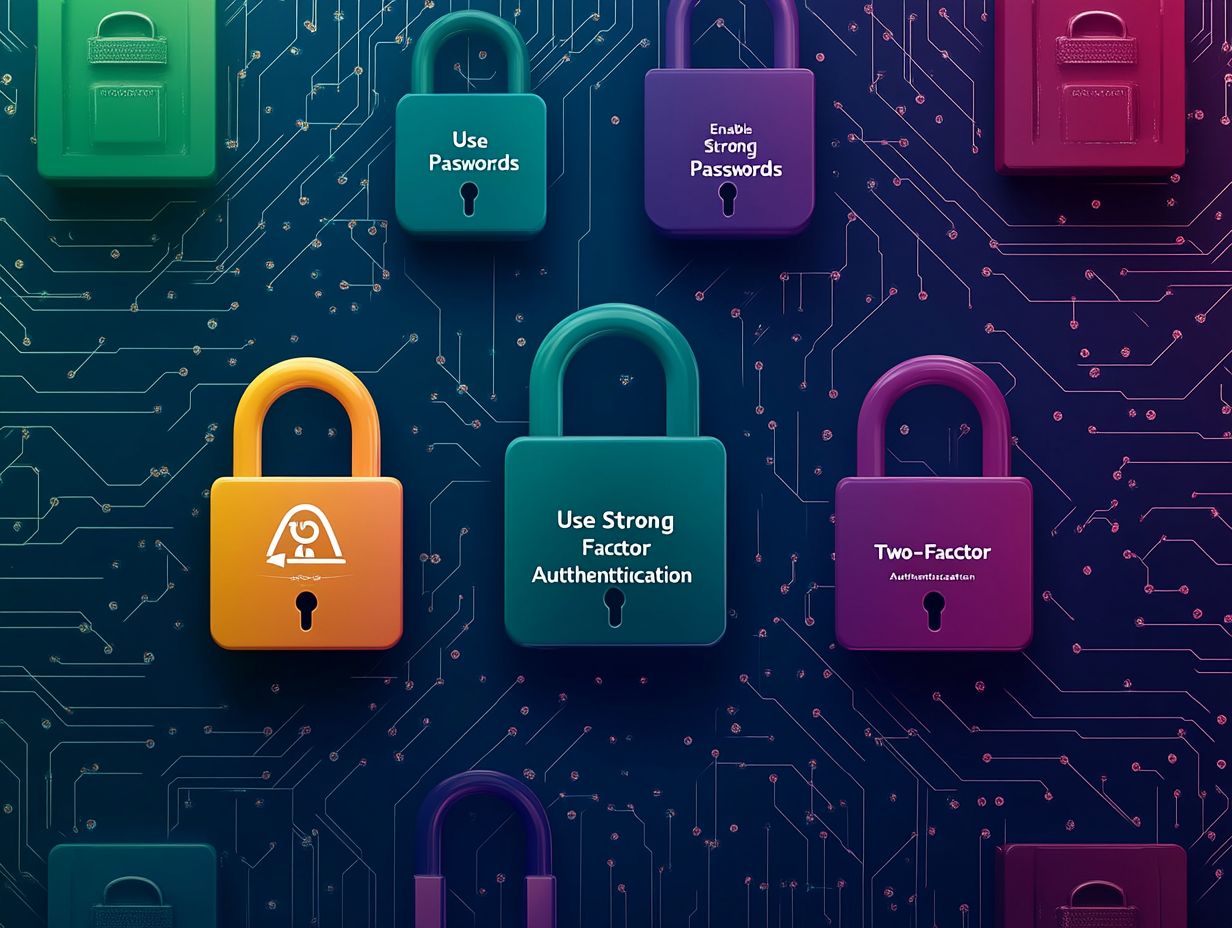5 Best Practices for Crypto Security
As the cryptocurrency world continues to flourish, securing your digital assets has become paramount. You must adopt effective strategies now to protect your investments!
This article presents five best practices for crypto security. Strong passwords are important, and you need to enable two-factor authentication (2FA), an extra security step that requires two forms of identification. You ll also discover the benefits of keeping your software updated and the value of using hardware wallets.
The article also covers common threats, recovery options, and future trends in crypto security, providing you with insights to navigate this ever-evolving landscape with confidence.
Contents
- Key Takeaways:
- 1. Use a Strong and Unique Password
- 2. Enable Two-Factor Authentication
- 3. Keep Your Software and Devices Updated
- 4. Use a Hardware Wallet for Storage
- 5. Be Cautious of Phishing Scams
- What Is Cryptocurrency Security and Why Is It Important?
- Frequently Asked Questions
- What are the 5 best practices for crypto security?
- Why is using a hardware wallet important for crypto security?
- What is Good Password Hygiene and Why is it Important for Crypto Security?
- How Does Two-Factor Authentication Enhance Crypto Security?
- Why is Using a VPN Recommended for Crypto Security?
- How Does Keeping Software Up to Date Contribute to Crypto Security?
Key Takeaways:

- Use strong and unique passwords to protect your crypto assets from hackers.
- Enable two-factor authentication for extra security.
- Keep your software updated to fend off cyber threats.
1. Use a Strong and Unique Password
In the world of cryptocurrency, crafting a strong and unique password is essential for protecting your digital assets. It serves as your first line of defense against unauthorized access.
The importance of robust password creation cannot be overstated, especially given the surge in cyberattacks targeting investors in digital currencies. A complex and unique password significantly lowers your chances of falling victim to hacking attempts.
Consider using password management tools to generate intricate passwords and store them securely, making it easier to maintain distinct credentials across various accounts.
In the volatile realm of cryptocurrency, the risks associated with weak passwords are amplified. A single breach could lead to irreversible losses, making investing in stronger passwords a vital step in safeguarding your financial future.
2. Enable Two-Factor Authentication
Enabling two-factor authentication (2FA) is crucial for enhancing your crypto security. It adds an extra layer of protection that significantly reduces the risk of unauthorized access to your accounts.
As cyber threats become more sophisticated, implementing 2FA is an essential practice. You ll find various forms of 2FA available some rely on mobile authentication apps, while others may send SMS codes or use hardware tokens.
Setting up this security feature generally involves linking your account with your chosen authentication method through the security settings of your trading platform.
The effectiveness of 2FA in mitigating risks associated with scams and phishing attacks is substantial. It complicates an attacker s ability to gain entry, thereby protecting your assets and personal information.
3. Keep Your Software and Devices Updated
Regularly updating your software and devices is essential for maintaining robust malware protection and securing your cryptocurrency investments against evolving threats.
Outdated software can become a prime target for cybercriminals. The vulnerabilities in older versions are often well-documented and easily exploited.
By keeping your operating systems and cryptocurrency wallets updated, you close security gaps and enhance functionality, allowing you to take advantage of the latest features. It’s crucial for you to be proactive in safeguarding your assets.
Automated tools can simplify this process significantly. Many applications offer scheduled update features that manage updates effortlessly, giving you peace of mind while minimizing the manual effort required to maintain your security.
4. Use a Hardware Wallet for Storage

Utilizing a hardware wallet to store your cryptocurrency is one of the most secure methods you have. These wallets offer cold storage solutions that protect your private keys from online threats and unauthorized access.
By keeping your private keys offline, you significantly reduce the risk of hacking and malware attacks. Software wallets and exchanges are often targeted by phishing attacks, but hardware wallets provide a much safer environment for managing your digital assets.
Follow best practices to maximize your protection when backing up and securing your wallet’s backup. For detailed guidance, check out how to safely store your cryptocurrency. Consider these strategies:
- Keep a written copy in a safe location, away from electronic devices.
- Utilize encryption to add an extra layer of security.
With these precautions, you can enjoy peace of mind knowing your investments are well protected.
5. Be Cautious of Phishing Scams
Be careful of phishing scams. These attacks can cause financial loss and put your personal information at risk.
Scammers often create fake websites that closely mimic legitimate platforms or send misleading emails to trick you into providing sensitive information.
To spot these suspicious communications, look for red flags like poor spelling, generic greetings, or unexpected urgent requests.
An effective strategy for preventing phishing includes:
- Regularly updating your passwords.
- Enabling two-factor authentication.
- Educating yourself about the latest scam techniques.
By staying informed and vigilant, you can better protect yourself against these deceitful schemes and safeguard your digital assets.
What Is Cryptocurrency Security and Why Is It Important?
Cryptocurrency security is a set of protocols and measures designed to protect your digital assets from theft, fraud, and unauthorized access. This is essential for anyone involved in cryptocurrency investing and trading.
Strong encryption keeps your transactions safe and upholds your confidentiality. It is also vital to follow ever-evolving regulations, as they create guidelines for a secure trading environment.
Ignoring these critical elements can lead to severe consequences, including financial losses that could devastate your portfolio and undermine trust in the market.
Whether you’re an experienced investor or just starting, you must prioritize understanding and implementing effective security practices. This proactive approach helps reduce risks and ensures the safety of your digital assets.
What Are the Common Threats to Cryptocurrency Security?
Common threats to your cryptocurrency security include malware attacks, unauthorized access to wallets, and phishing scams. Each of these poses a serious risk for anyone holding or trading digital currency.
As cryptocurrency’s popularity grows, these threats have become more visible. For example, malware can invade your devices, capturing sensitive information like private keys. This can lead to significant financial losses for you as an investor.
Statistics show that last year alone, the total value lost to these attacks soared into the billions. Unauthorized access to your wallet can happen if you use weak passwords or if exchanges you trust are compromised, making you vulnerable to theft.
Phishing scams have also evolved, becoming increasingly sophisticated in tricking you into revealing your login credentials, leading to a troubling rise in victimization.
These threats create a risky landscape for trading platforms and individuals like you. It is essential to implement enhanced security measures to safeguard your digital assets.
How Can One Secure Their Crypto Investments?

Securing your crypto investments requires careful planning that includes strong risk management strategies and secure wallets. Consider using backup methods, like wallets that require more than one key to authorize a transaction, to enhance your safety.
To further protect your assets, diversify your wallets. This means spreading your investments across different wallets to reduce risk. Hardware wallets offer an extra layer of protection, as they store your private keys offline, making them less vulnerable to hacking.
Establish a backup strategy for your seed phrases and private keys. Store your backups in multiple secure locations. By taking these proactive measures, you can strengthen your defenses against potential threats and safeguard your digital wealth.
What Are the Best Practices for Crypto Trading?
Best practices for crypto trading involve doing thorough research, using sound investment strategies, and choosing secure trading platforms to minimize risks while maximizing returns.
To improve your trading effectiveness, stay informed about market trends and fluctuations that can impact your investment outcomes.
Understanding market volatility is crucial, as it can lead to quick gains or significant losses. Effective risk management techniques are essential.
Selecting the right trading platform is equally important. Look for platforms that offer strong security features, user-friendly interfaces, and reasonable fees.
By adopting these strategies, you can navigate the complexities of the crypto market with greater confidence, enhancing your chances of success.
How Can One Recover Lost or Stolen Crypto?
Recovering lost or stolen crypto can feel overwhelming, but understanding crypto inheritance and setting up trusted contacts can help minimize your financial loss.
When you face this challenge, contact your exchange s support team right away; they often have established protocols to assist users in distress.
Consider trusted contacts who can access your crypto assets if needed.
The paths to recovery differ depending on whether the loss comes from forgotten passwords, lost devices, or outright theft.
By following these steps, you can chart a clearer course toward potentially recovering lost assets and ensuring your investments remain secure even in tough times.
What Are the Future Trends in Crypto Security?
The future of crypto security is set for transformation, focusing on advancements in decentralized security solutions, better encryption methods, and stricter regulations by 2024.
As the landscape evolves, these innovations will strengthen trust within the cryptocurrency ecosystem, attracting more mainstream investors. The use of AI-driven tools for fraud detection and risk management will significantly reduce the vulnerabilities that have long affected trading platforms.
On the regulatory front, upcoming changes may create a more structured environment that promotes responsible practices among market participants. This blend of technology and governance promises a robust framework that protects investors and nurtures a more stable cryptocurrency market, benefiting everyone involved.
Frequently Asked Questions

What are the 5 best practices for crypto security?
The 5 best practices for cryptocurrency trading include using a hardware wallet, practicing good password hygiene, enabling two-factor authentication, using a VPN, and keeping your software up to date.
Why is using a hardware wallet important for crypto security?
Hardware wallets are physical devices that store your cryptocurrency offline, making them less vulnerable to cyber attacks. This adds an extra layer of security to your crypto assets.
What is Good Password Hygiene and Why is it Important for Crypto Security?
Good password hygiene means using strong, unique passwords for each crypto account. Change your passwords regularly to keep your funds safe.
How Does Two-Factor Authentication Enhance Crypto Security?
Two-factor authentication adds another layer of protection. You must provide a code sent to your phone when logging in, making it harder for hackers to access your funds.
Why is Using a VPN Recommended for Crypto Security?
A VPN, or virtual private network, creates a secure connection over the internet. It hides your IP address and encrypts your data, making it tough for hackers to track your online activity.
How Does Keeping Software Up to Date Contribute to Crypto Security?
Software updates often include security patches that fix vulnerabilities. Keeping your software updated reduces the risk of cyber attacks significantly.






